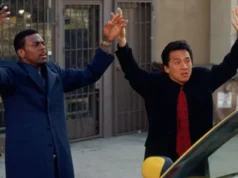Veteran distribution chief Chris Aronson will leave Paramount on Dec. 1 — a high-profile exit that spotlights the studio’s post-merger shakeup and what it means for the future of theatrical releases.

Chris Aronson, a familiar face to studio execs and theater owners alike, announced he will step down as Paramount’s president of domestic distribution on Dec. 1, capping a six-year run that helped steer the studio through several of its biggest theatrical hits.
The exit comes amid the studio’s recent merger with Skydance and a wider executive reshuffle — a reminder that big corporate tie-ups often ripple all the way down to the people who actually get films into theaters.
Aronson broke the news in an internal memo shared before the Cinema United Fall Summit, which Paramount is hosting on its lot. He used the moment to salute his team and the broader exhibition community, underscoring a belief he’s long championed: that distribution is the engine that keeps theatrical moviegoing alive.
He also promised to cheer on the group he called “a family,” and wrapped his note with a wry cultural nod — a line that echoed old-school showmanship and the bittersweet feeling of moving on.
Why people in the industry will feel Aronson’s absence isn’t hard to explain. He’s the kind of distribution executive who combined relentless focus on release strategy with a showman’s instinct — notorious, in a good way, for light-hearted costume cameos at CinemaCon, and respected for blunt, honest conversations with theater owners. Under his watch at Paramount, the studio released massive global hits such as Top Gun: Maverick (Paramount’s highest-grossing film), as well as mainstream crowd pleasers like Sonic the Hedgehog and the surprise horror success Smile.
Those titles helped cement theatrical rebounds after the pandemic slowdown and demonstrated the continued commercial bite of event filmmaking.
Aronson’s résumé stretches back well before Paramount. He led domestic distribution at 20th Century Fox during the rollouts of landmark films including Bohemian Rhapsody, Life of Pi, Avatar and Deadpool.
Earlier stops include MGM Distribution and the founding of Rentrak’s theatrical division, which played a key role in modern box-office tracking and analysis. Put simply: he knows both the art and the science of getting audiences through theater doors.
My take as a professional writer: this departure is significant not because one person leaves — turnover happens — but because it highlights a broader inflection point for theatrical distribution. Mergers like Paramount-Skydance change corporate priorities, and distribution teams often absorb the pressure to trim costs or pivot strategies.
That can be risky for moviegoing, which relies on coordinated partnerships between studios and exhibitors to program and market films in ways that feel eventful and communal.
Aronson’s public stance — that distribution must keep collaborating with exhibition and be willing to be “agents of change” — is a healthy one. The theatrical model needs leaders who treat moviegoing as an experience, not just a revenue stream.
The good news: his track record suggests he’s been among those leaders, prioritizing tentpole rollouts while still taking chances on genre films that catch fire through word of mouth.
Looking ahead, Paramount faces a choice: double down on theatrical-first strategies that drove Top Gun’s enormous box office, or accelerate alternative windows and streaming plays that sometimes erode the communal draw of cinemas.
Whoever replaces Aronson will inherit a roster of relationships and a set of expectations from exhibitors who want clear, predictable support from studios. How Paramount answers will matter to theater chains, independent cinemas, and movie lovers who still relish a dark auditorium and a shared gasp.
As for Aronson himself, his reputation and rolodex make him a plausible candidate for several next steps: an executive role at another studio, a consulting outfit advising distributors and exhibitors, or even launching a boutique distribution firm focused on theatrical-first releases.
Whatever he chooses, his departure marks the end of an era at Paramount’s distribution desk — and a reminder that the people behind release calendars shape the movies we experience, not just the movies themselves.
Got an opinion? Share whether you think studios should prioritize theaters or streaming — and tell us your favorite Aronson-era moviegoing moment.











